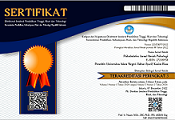Media dan Perilaku Pro Lingkungan: Studi Analisis Bibliometrik
Abstract
Penelitian media dan perilaku pro lingkungan merupakan tema yang relevan dengan kondisi saat ini. Paper ini bertujuan untuk mereviu penelitian tentang media dan perilaku pro lingkungan dengan analisisi bibliometrik pada dokumen terindeks Scopus dalam rentang 2014-2023. Analisis data dilakukan dengan R paket bibliometrik. Studi ini mengidentifikasi kontributor utama di lapangan (penulis paling produktif: Wang Y.), jurnal terkemuka di lapangan (jurnal paling produktif: Sustainability (Switzerland), lokasi geografis asal penulis terkosentrasi pada negara China dan universitas yang paling produktif (Shanghai Jiao Tong University). Selain itu, ada dua kluster yaitu lingkungan berkelanjutan yang berisi tema terkait internet, internet of thing (IoT), dampak lingkungan berkelanjutan, sedangkan pada kluster kedua tentang manusia, yang bersisi tentang manusia, social media, persepsi, dewasa. Tema yang berkembang diidentifikasi peluang riset terkait IoT, efisiensi energi dan smart city. Studi ini diharapkan dapat meningkatkan peran media (internet, social media, teknologi informasi) dalam meningkatkan perilaku pro lingkungan melalui riset-riset oleh para akademisi dan kebijakan dari para stakeholders yang ramah lingkungan.
Keywords
Full Text:
PDFReferences
Ajzen, I. (1991). The theory of planned behavior. Organizational Behavior and Human Decision Processes, 50(2), 179–211. https://doi.org/10.1016/0749-5978(91)90020-T
Anderson, D. J., & Krettenauer, T. (2021). Connectedness to nature and pro-environmental behaviour from early adolescence to adulthood: A comparison of urban and rural canada. Sustainability (Switzerland), 13(7). https://doi.org/10.3390/su13073655
Aria, M., & Cuccurullo, C. (2017). bibliometrix: An R-tool for comprehensive science mapping analysis. Journal of Informetrics, 11(4), 959–975. https://doi.org/10.1016/j.joi.2017.08.007
Bamberg, S., & Möser, G. (2007). Twenty years after Hines, Hungerford, and Tomera: A new meta-analysis of psycho-social determinants of pro-environmental behaviour. Journal of Environmental Psychology, 27(1), 14–25. https://doi.org/10.1016/j.jenvp.2006.12.002
Barr, S. (2007). Factors influencing environmental attitudes and behaviors: A U.K. case study of household waste management. In Environment and Behavior (Vol. 39, Issue 4). https://doi.org/10.1177/0013916505283421
Bertossi, A., & Marangon, F. (2022). A literature review on the strategies implemented by higher education institutions from 2010 to 2020 to foster pro-environmental behavior of students. International Journal of Sustainability in Higher Education, 23(3), 522–547. https://doi.org/10.1108/IJSHE-11-2020-0459
Brown, K. W., & Kasser, T. (2005). Are psychological and ecological well-being compatible? The role of values, mindfulness, and lifestyle. Social Indicators Research, 74(2), 349–368. https://doi.org/10.1007/s11205-004-8207-8
Casmana, A. R., Dewantara, J. A., Timoera, D. A., Kusmawati, A. P., & Syafrudin, I. (2023). Global citizenship: preparing the younger generation to possess pro-environment behavior, mutual assistance and tolerance awareness through school engagement. Globalisation, Societies and Education, 21(1), 15–32. https://doi.org/10.1080/14767724.2021.2013167
Castro e Silva, M., & Teixeira, A. A. C. (2011). A bibliometric account of the evolution of EE in the last two decades. Is ecological economics (becoming) a post-normal science? Ecological Economics, 70(5), 849–862. https://doi.org/10.1016/j.ecolecon.2010.11.016
Chatti, W., & Majeed, M. T. (2022). Investigating the links between ICTs, passenger transportation, and environmental sustainability. Environmental Science and Pollution Research, 29(18), 26564–26574. https://doi.org/10.1007/s11356-021-17834-3
Chin, J., Jiang, B. C., Mufidah, I., Persada, S. F., & Noer, B. A. (2018). The investigation of consumers’ behavior intention in using green skincare products: A pro- environmental behavior model approach. Sustainability (Switzerland), 10(11). https://doi.org/10.3390/su10113922
Concari, A., Kok, G., & Martens, P. (2022). Recycling behaviour: Mapping knowledge domain through bibliometrics and text mining. Journal of Environmental Management, 303, 114160. https://doi.org/10.1016/j.jenvman.2021.114160
Corraliza, J. A., & Berenguer, J. (2000). Environmental values, beliefs, and actions: A situational approach. Environment and Behavior, 32(6), 832–848. https://doi.org/10.1177/00139160021972829
Cuadrado, E., Macias-Zambrano, L. H., Carpio, A. J., & Tabernero, C. (2022). The moderating effect of collective efficacy on the relationship between environmental values and ecological behaviors. Environment, Development and Sustainability, 24(3), 4175–4202. https://doi.org/10.1007/s10668-021-01611-w
Díaz, M. F., Charry, A., Sellitti, S., Ruzzante, M., Enciso, K., & Burkart, S. (2020). Psychological Factors Influencing Pro-environmental Behavior in Developing Countries: Evidence From Colombian and Nicaraguan Students. Frontiers in Psychology, 11(December). https://doi.org/10.3389/fpsyg.2020.580730
Dolnicar, S., & Grün, B. (2009). Environmentally friendly behavior: Can heterogeneity among individuals and contexts/environments be harvested for improved sustainable management? Environment and Behavior, 41(5), 693–714. https://doi.org/10.1177/0013916508319448
Donthu, N., Kumar, S., Mukherjee, D., Pandey, N., & Lim, W. M. (2021). How to conduct a bibliometric analysis: An overview and guidelines. Journal of Business Research, 133, 285–296. https://doi.org/10.1016/j.jbusres.2021.04.070
Farrukh, M., Raza, A., Mansoor, A., Khan, M. S., & Lee, J. W. C. (2023). Trends and patterns in pro-environmental behaviour research: a bibliometric review and research agenda. Benchmarking, 30(3), 681–696. https://doi.org/10.1108/BIJ-10-2020-0521
Gifford, R., & Nilsson, A. (2014). Personal and social factors that influence pro-environmental concern and behaviour: A review. International Journal of Psychology, 49(3), 141–157. https://doi.org/10.1002/ijop.12034
Gong, X., Zhang, J., Zhang, H., Cheng, M., Wang, F., & Yu, N. (2020). Internet use encourages pro-environmental behavior: Evidence from China. Journal of Cleaner Production, 256(June 2019), 120725. https://doi.org/10.1016/j.jclepro.2020.120725
Guleria, D., & Kaur, G. (2021). Bibliometric analysis of ecopreneurship using VOSviewer and RStudio Bibliometrix, 1989–2019. Library Hi Tech, 39(4), 1001–1024. https://doi.org/10.1108/LHT-09-2020-0218
Gunawan, B., Ratmono, B. M., Abdullah, A. G., Sadida, N., & Kaprisma, H. (2022). Research Mapping in the Use of Technology for Fake … | 472. Indonesian Journal of Science & Technology, 7(3), 471–496.
Gustafson, A., Pace, A., Singh, S., & Goldberg, M. H. (2022). What do people say is the most important reason to protect nature? An analysis of pro-environmental motives across 11 countries. Journal of Environmental Psychology, 80, 101762. https://doi.org/10.1016/j.jenvp.2022.101762
Haba, H. F., Bredillet, C., & Dastane, O. (2023). Green consumer research: Trends and way forward based on bibliometric analysis. Cleaner and Responsible Consumption, 8(December), 100089. https://doi.org/10.1016/j.clrc.2022.100089
Han, R., & Cheng, Y. (2020). The influence of norm perception on pro-environmental behavior: A comparison between the moderating roles of traditional media and social media. International Journal of Environmental Research and Public Health, 17(19), 1–20. https://doi.org/10.3390/ijerph17197164
Hasebrook, J. P., Michalak, L., Wessels, A., Koenig, S., Spierling, S., & Kirmsse, S. (2022). Green Behavior: Factors Influencing Behavioral Intention and Actual Environmental Behavior of Employees in the Financial Service Sector. Sustainability (Switzerland), 14(17). https://doi.org/10.3390/su141710814
Houlden, V., Jani, A., & Hong, A. (2021). Is biodiversity of greenspace important for human health and wellbeing? A bibliometric analysis and systematic literature review. Urban Forestry and Urban Greening, 66, 127385. https://doi.org/10.1016/j.ufug.2021.127385
Huang, H. (2016). Media use, environmental beliefs, self-efficacy, and pro-environmental behavior. Journal of Business Research, 69(6), 2206–2212. https://doi.org/10.1016/j.jbusres.2015.12.031
Ibáñez-Rueda, N., Guillén-Royo, M., & Guardiola, J. (2020). Pro-environmental behavior, connectedness to nature, and wellbeing dimensions among granada students. Sustainability (Switzerland), 12(21), 1–16. https://doi.org/10.3390/su12219171
Iqbal, A., Akram, H., & Haroon, S. (2023). View of Exploring The Role Of Media In Creating Awareness About Environment Among University Students. Journal of Positive School Psychology, 7(3), 208–226. https://journalppw.com/index.php/jpsp/article/view/15996
Kaiser, F. G., Doka, G., Hofstetter, P., & Ranney, M. A. (2003). Ecological behavior and its environmental consequences: A life cycle assessment of a self-report measure. Journal of Environmental Psychology, 23(1), 11–20. https://doi.org/10.1016/S0272-4944(02)00075-0
Kaiser, F. G., Hartig, T., Brügger, A., & Duvier, C. (2013). Environmental Protection and Nature as Distinct Attitudinal Objects: An Application of the Campbell Paradigm. Environment and Behavior, 45(3), 369–398. https://doi.org/10.1177/0013916511422444
Karimi, S. (2019). Pro-environmental behaviours among agricultural students: An examination of the value-belief-norm theory. Journal of Agricultural Science and Technology, 21(2), 249–263. https://doi.org/10.2139/ssrn.3398141
Karimi, Saeid, Liobikienė, G., Saadi, H., & Sepahvand, F. (2021). The influence of media usage on iranian students’ pro-envi-ronmental behaviors: An application of the extended theory of planned behavior. Sustainability (Switzerland), 13(15). https://doi.org/10.3390/su13158299
Kothe, E. J., Ling, M., North, M., Klas, A., Mullan, B. A., & Novoradovskaya, L. (2019). Protection motivation theory and pro-environmental behaviour: A systematic mapping review. Australian Journal of Psychology, 71(4), 411–432. https://doi.org/10.1111/ajpy.12271
Liu, P., Han, C., & Teng, M. (2021). The influence of Internet use on pro-environmental behaviors: An integrated theoretical framework. Resources, Conservation and Recycling, 164(1), 105162. https://doi.org/10.1016/j.resconrec.2020.105162
Liu, Y., & Li, X. (2021). Pro-Environmental Behavior Predicted by Media Exposure, SNS Involvement, and Cognitive and Normative Factors. Environmental Communication, 15(7), 954–968. https://doi.org/10.1080/17524032.2021.1922479
Mal, H., & Nehra, N. S. (2023). The Impact of IoT Characteristics, Cultural Factors and Safety Concerns on Consumer Purchase Intention of Green Electronic Products. Sustainability (Switzerland), 15(8). https://doi.org/10.3390/su15086597
Matsumoto, S. (2014). Spouses’ time allocation to pro-environmental activities: Who is saving the environment at home? Review of Economics of the Household, 12(1), 159–176. https://doi.org/10.1007/s11150-013-9177-x
McDonald, F. V. (2014). Developing an integrated conceptual framework of pro-environmental behavior in the workplace through synthesis of the current literature. Administrative Sciences, 4(3), 276–303. https://doi.org/10.3390/admsci4030276
Meng, Y., Chung, D., & Zhang, A. (2023). The effect of social media environmental information exposure on the intention to participate in pro-environmental behavior. Plos One, 18(11), e0294577. https://doi.org/10.1371/journal.pone.0294577
Merigó, J. M., Gil-Lafuente, A. M., & Yager, R. R. (2015). An overview of fuzzy research with bibliometric indicators. Applied Soft Computing Journal, 27, 420–433. https://doi.org/10.1016/j.asoc.2014.10.035
Mustafa, Z., Husin, M. H., Syed-Mohamad, S. M., & Abdullah, N. A. (2020). Global research trends in Pro-Environmental Behaviour (PEB) studies in the field of computer science from 1976-2019: A bibliometric analysis. Journal of Scientometric Research, 9(2), 136–145. https://doi.org/10.5530/JSCIRES.9.2.17
Ogiemwonyi, O. (2022). Factors influencing generation Y green behaviour on green products in Nigeria: An application of theory of planned behaviour. Environmental and Sustainability Indicators, 13(December 2021), 100164. https://doi.org/10.1016/j.indic.2021.100164
Oreg, S., & Katz-Gerro, T. (2006). Predicting proenvironmental behavior cross-nationally: Values, the theory of planned behavior, and value-belief-norm theory. Environment and Behavior, 38(4), 462–483. https://doi.org/10.1177/0013916505286012
Patel, K. K., Patel, S. M., & Scholar, P. G. (2016). Internet of Things-IOT: Definition, Characteristics, Architecture, Enabling Technologies, Application & Future Challenges. International Journal of Engineering Science and Computing, 6(5), 1–10. https://doi.org/10.4010/2016.1482
Phulwani, P. R., Kumar, D., & Goyal, P. (2021). From systematic literature review to a conceptual framework for consumer disposal behavior towards personal communication devices. Journal of Consumer Behaviour, 20(5), 1353–1370. https://doi.org/10.1002/cb.1940
Rahsilaputeri, M., Sumarwan, U., & Suharjo, B. (2022). The role of media, life experience, knowledge and government support in creating Generation Z’s pro-environmental behavior in Indonesia. Sustinere Journal of Environment and Sustainability, 6(2), 132–156.
Ruhanen, L., Weiler, B., Moyle, B. D., & McLennan, C. lee J. (2015). Trends and patterns in sustainable tourism research: a 25-year bibliometric analysis. Journal of Sustainable Tourism, 23(4), 517–535. https://doi.org/10.1080/09669582.2014.978790
Schmitt, M. T., Aknin, L. B., Axsen, J., & Shwom, R. L. (2018). Unpacking the Relationships Between Pro-environmental Behavior, Life Satisfaction, and Perceived Ecological Threat. Ecological Economics, 143(January), 130–140. https://doi.org/10.1016/j.ecolecon.2017.07.007
Si, H., Shi, J. G., Tang, D., Wen, S., Miao, W., & Duan, K. (2019). Application of the theory of planned behavior in environmental science: a comprehensive bibliometric analysis. International Journal of Environmental Research and Public Health, 16(15). https://doi.org/10.3390/ijerph16152788
Steg, L., de Groot, J. I. M., Dreijerink, L., Abrahamse, W., & Siero, F. (2011). General antecedents of personal norms, policy acceptability, and intentions: the role of values, worldviews, and environmental concern. Society and Natural Resources, 24(4), 349–367. https://doi.org/10.1080/08941920903214116
Stern, P. C., Dietz, T., Abel, T., Guagnano, G. A., & Kalof, L. (1999). A value-belief-norm theory of support for social movements: The case of environmentalism. Human Ecology Review, 6(2), 81–97.
Streimikiene, D. (2015). Environmental indicators for the assessment of quality of life. Intellectual Economics, 9(1), 67–79. https://doi.org/10.1016/j.intele.2015.10.001
Suárez-Varela, M., Guardiola, J., & González-Gómez, F. (2016). Do Pro-environmental Behaviors and Awareness Contribute to Improve Subjective Well-being? Applied Research in Quality of Life, 11(2), 429–444. https://doi.org/10.1007/s11482-014-9372-9
Suendarti, M. (2022). A Model of Critical Consideration of Environmental Education: Concepts, Contexts, and Competencies. Educational Sciences: Theory and Practice, 22(2), 56–71. https://doi.org/10.12738/jestp.2022.2.0005
Tian, H., & Liu, X. (2022). Pro-Environmental Behavior Research: Theoretical Progress and Future Directions. International Journal of Environmental Research and Public Health, 19(11). https://doi.org/10.3390/ijerph19116721
Wai, Y. S., & Bojei, J. (2015). Proposed Conceptual Framework on Cohesive Effect of Extrinsic and Intrinsic Factors on Sustainable Behaviours. Procedia - Social and Behavioral Sciences, 172, 449–456. https://doi.org/10.1016/j.sbspro.2015.01.378
Wang, B. Z., & Cheng, Z. (2017). Environmental Perceptions, Happiness and Pro-environmental Actions in China. Social Indicators Research, 132(1), 357–375. https://doi.org/10.1007/s11205-015-1218-9
Wang, H. (2022). Knowledge or Responsibility? The Role of Media Use on Citizens’ Willingness to Pay for Environment Governance. Sustainability (Switzerland), 14(21), 14538. https://doi.org/10.3390/su142114538
Wen, Q. J., Ren, Z. J., Lu, H., & Wu, J. F. (2021). The progress and trend of BIM research: A bibliometrics-based visualization analysis. Automation in Construction, 124. https://doi.org/10.1016/j.autcon.2021.103558
Xia, Z., & Liu, Y. (2021). Aiding pro-environmental behavior measurement by Internet of Things. Current Research in Behavioral Sciences, 2(September), 100055. https://doi.org/10.1016/j.crbeha.2021.100055
Xiao, Y., Liu, X., & Ren, T. (2022). Internet use and pro-environmental behavior: Evidence from China. PLoS ONE, 17(1 January), 1–27. https://doi.org/10.1371/journal.pone.0262644
Xing, Y., Li, M., & Liao, Y. (2022). Trust, Identity, and Public-Sphere Pro-environmental Behavior in China: An Extended Attitude-Behavior-Context Theory. Frontiers in Psychology, 13(June), 1–13. https://doi.org/10.3389/fpsyg.2022.919578
Xu, J., & Han, R. (2019). The influence of place attachment on pro-environmental behaviors: The moderating effect of social media. International Journal of Environmental Research and Public Health, 16(24). https://doi.org/10.3390/ijerph16245100
Zhu, C., Tong, P., & Songs, Z. (2021). A bibliometric and visual analysis of environmental behavior research. Sustainability (Switzerland), 13(18), 10338. https://doi.org/10.3390/su131810338
DOI: http://dx.doi.org/10.24014/pib.v5i2.26485
Refbacks
- There are currently no refbacks.
Redaksi Psikobuletin: Buletin Ilmiah Psikologi
Publisher: Universitas Islam Negeri Sultan Syarif Kasim Riau
Jl. H.R. Soebrantas Km. 15.5 No. 155 Gedung Fakultas Psikologi UIN Sultan Syarif Kasim Riau Kel. Tuahmadani Kec. Tampan Pekanbaru - Riau 28293.
E-mail : psikobuletin@uin-suska.ac.id / Website :http://ejournal.uin-suska.ac.id/index.php/Psikobuletin
Psikobuletin : Buletin Ilmiah Psikologi by Fakultas Psikologi is licensed under a Creative Commons Attribution 4.0 International License.



31.png)





